UGB 110 Business Law Assignment: Sale of Goods and Remedies
VerifiedAdded on 2023/01/06
|10
|3763
|67
Homework Assignment
AI Summary
This assignment delves into the intricacies of business law, focusing on the Sale of Goods Act 1979 and its implications in a practical case study involving Mr. John and a departmental store. The analysis covers implied terms associated with the sale of goods and services, scrutinizing the seller's obligations and buyer's rights under the Act. It further explores statutory provisions concerning the transfer of property and possession, including the conditions for a valid contract and the implications of product descriptions. The assignment evaluates buyer and seller remedies in case of contract breaches, such as non-delivery, non-acceptance, and breach of warranty. Finally, it examines product liability provisions for faulty goods, assessing the responsibilities of both the seller and the buyer when goods fail to meet the expected standards. The assignment aims to provide a comprehensive understanding of the legal framework governing commercial transactions and the rights of consumers in the context of faulty goods.

Individual project
Paraphrase This Document
Need a fresh take? Get an instant paraphrase of this document with our AI Paraphraser
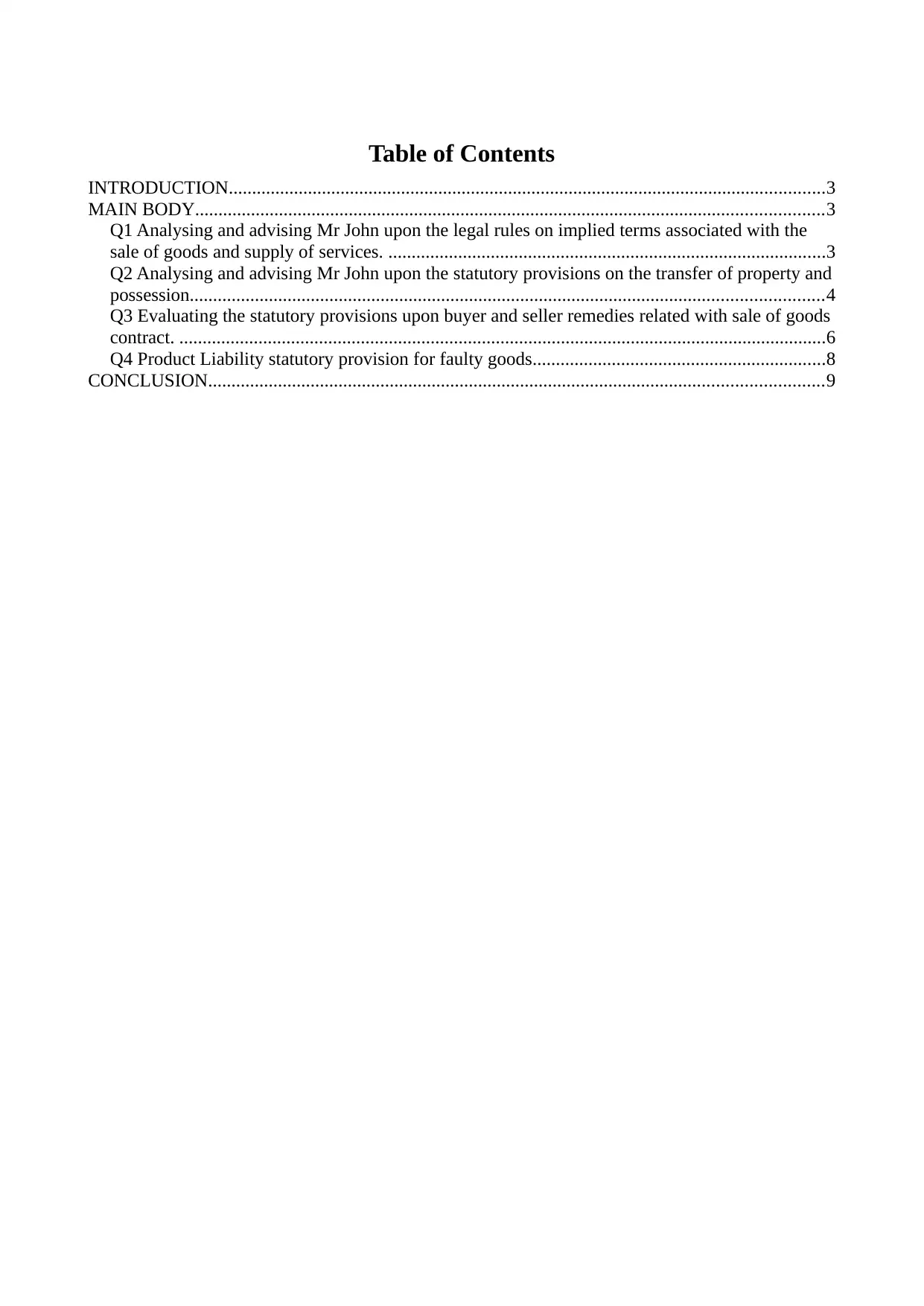
Table of Contents
INTRODUCTION................................................................................................................................3
MAIN BODY.......................................................................................................................................3
Q1 Analysing and advising Mr John upon the legal rules on implied terms associated with the
sale of goods and supply of services. ..............................................................................................3
Q2 Analysing and advising Mr John upon the statutory provisions on the transfer of property and
possession........................................................................................................................................4
Q3 Evaluating the statutory provisions upon buyer and seller remedies related with sale of goods
contract. ...........................................................................................................................................6
Q4 Product Liability statutory provision for faulty goods...............................................................8
CONCLUSION....................................................................................................................................9
INTRODUCTION................................................................................................................................3
MAIN BODY.......................................................................................................................................3
Q1 Analysing and advising Mr John upon the legal rules on implied terms associated with the
sale of goods and supply of services. ..............................................................................................3
Q2 Analysing and advising Mr John upon the statutory provisions on the transfer of property and
possession........................................................................................................................................4
Q3 Evaluating the statutory provisions upon buyer and seller remedies related with sale of goods
contract. ...........................................................................................................................................6
Q4 Product Liability statutory provision for faulty goods...............................................................8
CONCLUSION....................................................................................................................................9
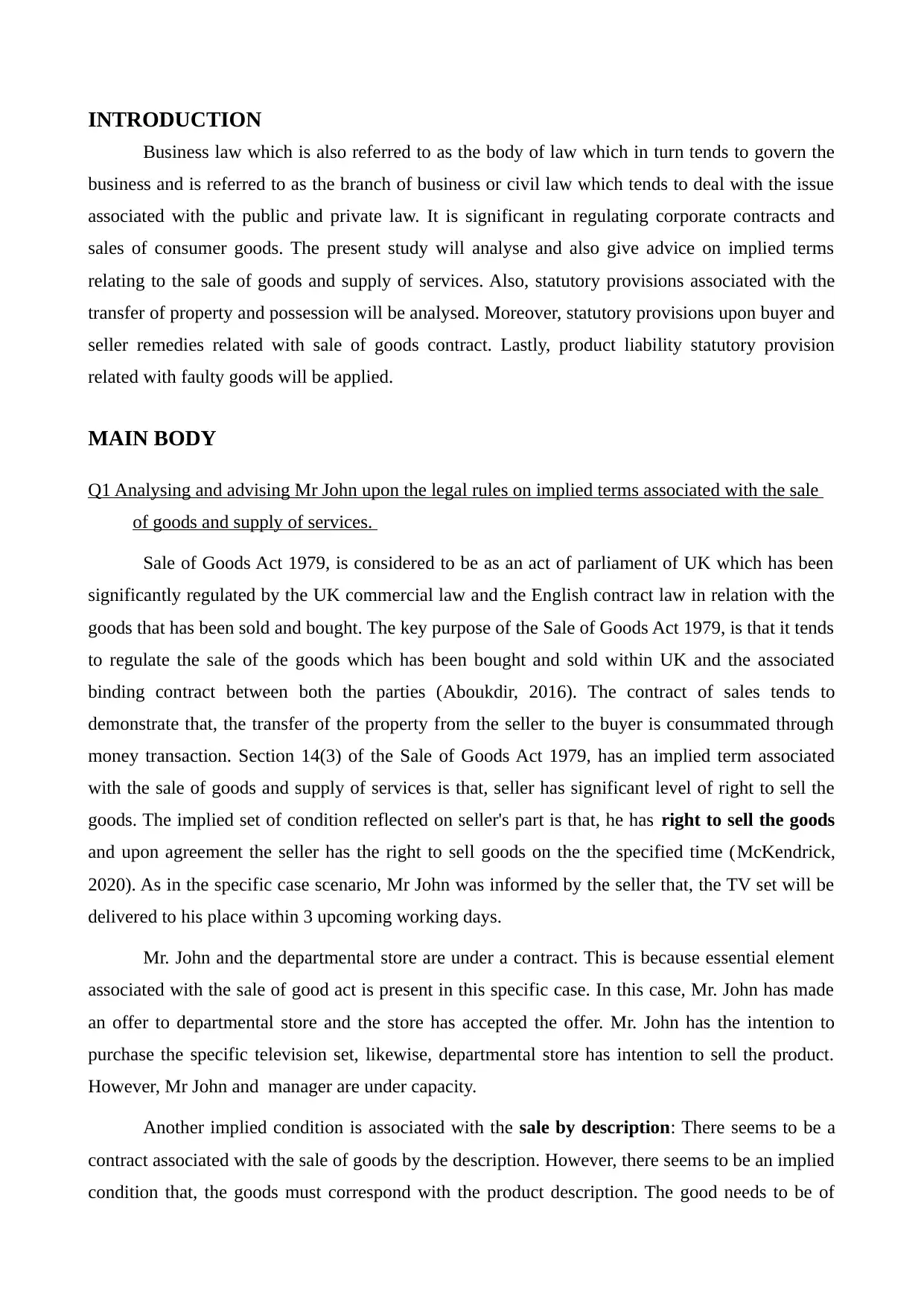
INTRODUCTION
Business law which is also referred to as the body of law which in turn tends to govern the
business and is referred to as the branch of business or civil law which tends to deal with the issue
associated with the public and private law. It is significant in regulating corporate contracts and
sales of consumer goods. The present study will analyse and also give advice on implied terms
relating to the sale of goods and supply of services. Also, statutory provisions associated with the
transfer of property and possession will be analysed. Moreover, statutory provisions upon buyer and
seller remedies related with sale of goods contract. Lastly, product liability statutory provision
related with faulty goods will be applied.
MAIN BODY
Q1 Analysing and advising Mr John upon the legal rules on implied terms associated with the sale
of goods and supply of services.
Sale of Goods Act 1979, is considered to be as an act of parliament of UK which has been
significantly regulated by the UK commercial law and the English contract law in relation with the
goods that has been sold and bought. The key purpose of the Sale of Goods Act 1979, is that it tends
to regulate the sale of the goods which has been bought and sold within UK and the associated
binding contract between both the parties (Aboukdir, 2016). The contract of sales tends to
demonstrate that, the transfer of the property from the seller to the buyer is consummated through
money transaction. Section 14(3) of the Sale of Goods Act 1979, has an implied term associated
with the sale of goods and supply of services is that, seller has significant level of right to sell the
goods. The implied set of condition reflected on seller's part is that, he has right to sell the goods
and upon agreement the seller has the right to sell goods on the the specified time (McKendrick,
2020). As in the specific case scenario, Mr John was informed by the seller that, the TV set will be
delivered to his place within 3 upcoming working days.
Mr. John and the departmental store are under a contract. This is because essential element
associated with the sale of good act is present in this specific case. In this case, Mr. John has made
an offer to departmental store and the store has accepted the offer. Mr. John has the intention to
purchase the specific television set, likewise, departmental store has intention to sell the product.
However, Mr John and manager are under capacity.
Another implied condition is associated with the sale by description: There seems to be a
contract associated with the sale of goods by the description. However, there seems to be an implied
condition that, the goods must correspond with the product description. The good needs to be of
Business law which is also referred to as the body of law which in turn tends to govern the
business and is referred to as the branch of business or civil law which tends to deal with the issue
associated with the public and private law. It is significant in regulating corporate contracts and
sales of consumer goods. The present study will analyse and also give advice on implied terms
relating to the sale of goods and supply of services. Also, statutory provisions associated with the
transfer of property and possession will be analysed. Moreover, statutory provisions upon buyer and
seller remedies related with sale of goods contract. Lastly, product liability statutory provision
related with faulty goods will be applied.
MAIN BODY
Q1 Analysing and advising Mr John upon the legal rules on implied terms associated with the sale
of goods and supply of services.
Sale of Goods Act 1979, is considered to be as an act of parliament of UK which has been
significantly regulated by the UK commercial law and the English contract law in relation with the
goods that has been sold and bought. The key purpose of the Sale of Goods Act 1979, is that it tends
to regulate the sale of the goods which has been bought and sold within UK and the associated
binding contract between both the parties (Aboukdir, 2016). The contract of sales tends to
demonstrate that, the transfer of the property from the seller to the buyer is consummated through
money transaction. Section 14(3) of the Sale of Goods Act 1979, has an implied term associated
with the sale of goods and supply of services is that, seller has significant level of right to sell the
goods. The implied set of condition reflected on seller's part is that, he has right to sell the goods
and upon agreement the seller has the right to sell goods on the the specified time (McKendrick,
2020). As in the specific case scenario, Mr John was informed by the seller that, the TV set will be
delivered to his place within 3 upcoming working days.
Mr. John and the departmental store are under a contract. This is because essential element
associated with the sale of good act is present in this specific case. In this case, Mr. John has made
an offer to departmental store and the store has accepted the offer. Mr. John has the intention to
purchase the specific television set, likewise, departmental store has intention to sell the product.
However, Mr John and manager are under capacity.
Another implied condition is associated with the sale by description: There seems to be a
contract associated with the sale of goods by the description. However, there seems to be an implied
condition that, the goods must correspond with the product description. The good needs to be of
⊘ This is a preview!⊘
Do you want full access?
Subscribe today to unlock all pages.

Trusted by 1+ million students worldwide
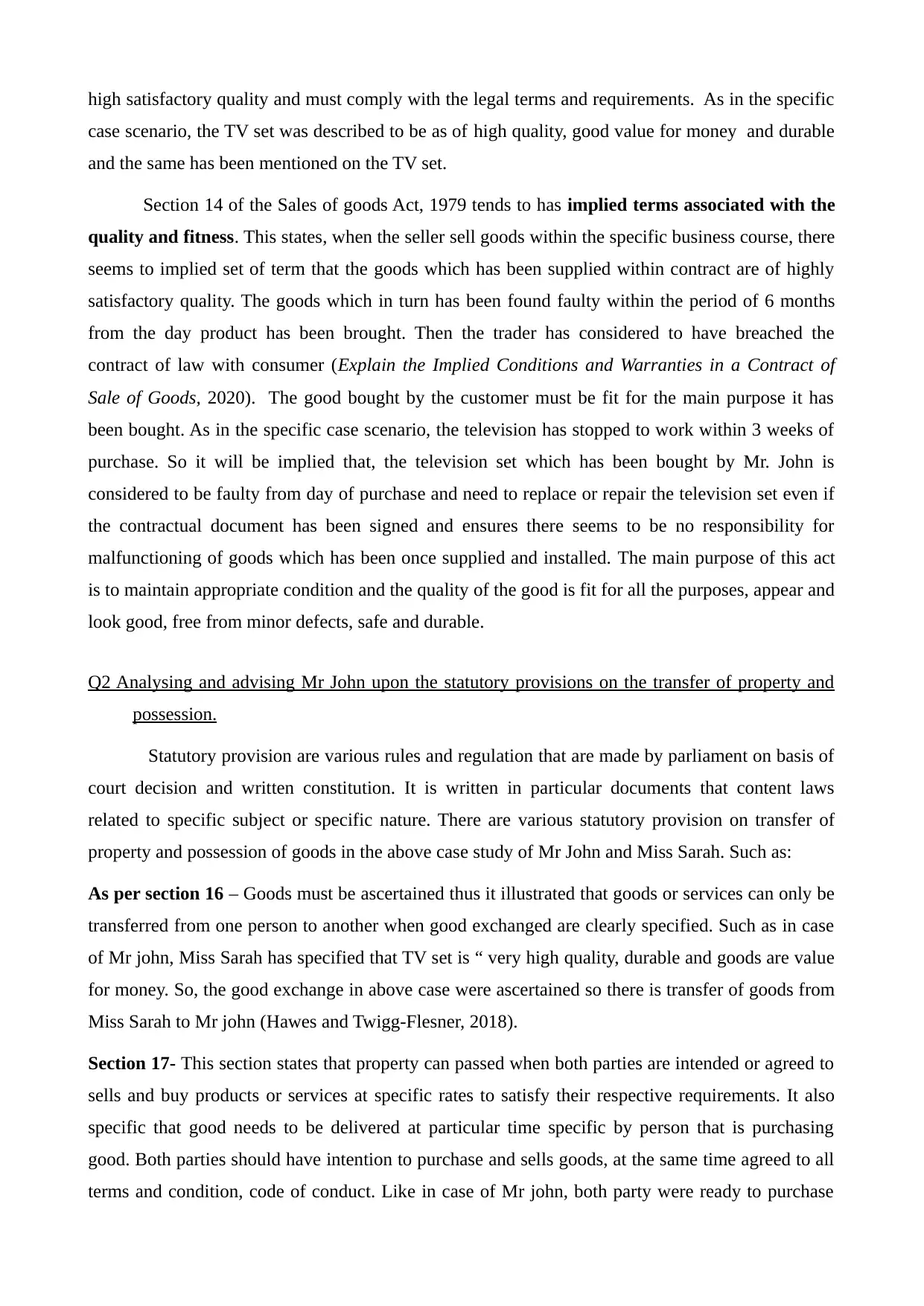
high satisfactory quality and must comply with the legal terms and requirements. As in the specific
case scenario, the TV set was described to be as of high quality, good value for money and durable
and the same has been mentioned on the TV set.
Section 14 of the Sales of goods Act, 1979 tends to has implied terms associated with the
quality and fitness. This states, when the seller sell goods within the specific business course, there
seems to implied set of term that the goods which has been supplied within contract are of highly
satisfactory quality. The goods which in turn has been found faulty within the period of 6 months
from the day product has been brought. Then the trader has considered to have breached the
contract of law with consumer (Explain the Implied Conditions and Warranties in a Contract of
Sale of Goods, 2020). The good bought by the customer must be fit for the main purpose it has
been bought. As in the specific case scenario, the television has stopped to work within 3 weeks of
purchase. So it will be implied that, the television set which has been bought by Mr. John is
considered to be faulty from day of purchase and need to replace or repair the television set even if
the contractual document has been signed and ensures there seems to be no responsibility for
malfunctioning of goods which has been once supplied and installed. The main purpose of this act
is to maintain appropriate condition and the quality of the good is fit for all the purposes, appear and
look good, free from minor defects, safe and durable.
Q2 Analysing and advising Mr John upon the statutory provisions on the transfer of property and
possession.
Statutory provision are various rules and regulation that are made by parliament on basis of
court decision and written constitution. It is written in particular documents that content laws
related to specific subject or specific nature. There are various statutory provision on transfer of
property and possession of goods in the above case study of Mr John and Miss Sarah. Such as:
As per section 16 – Goods must be ascertained thus it illustrated that goods or services can only be
transferred from one person to another when good exchanged are clearly specified. Such as in case
of Mr john, Miss Sarah has specified that TV set is “ very high quality, durable and goods are value
for money. So, the good exchange in above case were ascertained so there is transfer of goods from
Miss Sarah to Mr john (Hawes and Twigg-Flesner, 2018).
Section 17- This section states that property can passed when both parties are intended or agreed to
sells and buy products or services at specific rates to satisfy their respective requirements. It also
specific that good needs to be delivered at particular time specific by person that is purchasing
good. Both parties should have intention to purchase and sells goods, at the same time agreed to all
terms and condition, code of conduct. Like in case of Mr john, both party were ready to purchase
case scenario, the TV set was described to be as of high quality, good value for money and durable
and the same has been mentioned on the TV set.
Section 14 of the Sales of goods Act, 1979 tends to has implied terms associated with the
quality and fitness. This states, when the seller sell goods within the specific business course, there
seems to implied set of term that the goods which has been supplied within contract are of highly
satisfactory quality. The goods which in turn has been found faulty within the period of 6 months
from the day product has been brought. Then the trader has considered to have breached the
contract of law with consumer (Explain the Implied Conditions and Warranties in a Contract of
Sale of Goods, 2020). The good bought by the customer must be fit for the main purpose it has
been bought. As in the specific case scenario, the television has stopped to work within 3 weeks of
purchase. So it will be implied that, the television set which has been bought by Mr. John is
considered to be faulty from day of purchase and need to replace or repair the television set even if
the contractual document has been signed and ensures there seems to be no responsibility for
malfunctioning of goods which has been once supplied and installed. The main purpose of this act
is to maintain appropriate condition and the quality of the good is fit for all the purposes, appear and
look good, free from minor defects, safe and durable.
Q2 Analysing and advising Mr John upon the statutory provisions on the transfer of property and
possession.
Statutory provision are various rules and regulation that are made by parliament on basis of
court decision and written constitution. It is written in particular documents that content laws
related to specific subject or specific nature. There are various statutory provision on transfer of
property and possession of goods in the above case study of Mr John and Miss Sarah. Such as:
As per section 16 – Goods must be ascertained thus it illustrated that goods or services can only be
transferred from one person to another when good exchanged are clearly specified. Such as in case
of Mr john, Miss Sarah has specified that TV set is “ very high quality, durable and goods are value
for money. So, the good exchange in above case were ascertained so there is transfer of goods from
Miss Sarah to Mr john (Hawes and Twigg-Flesner, 2018).
Section 17- This section states that property can passed when both parties are intended or agreed to
sells and buy products or services at specific rates to satisfy their respective requirements. It also
specific that good needs to be delivered at particular time specific by person that is purchasing
good. Both parties should have intention to purchase and sells goods, at the same time agreed to all
terms and condition, code of conduct. Like in case of Mr john, both party were ready to purchase
Paraphrase This Document
Need a fresh take? Get an instant paraphrase of this document with our AI Paraphraser
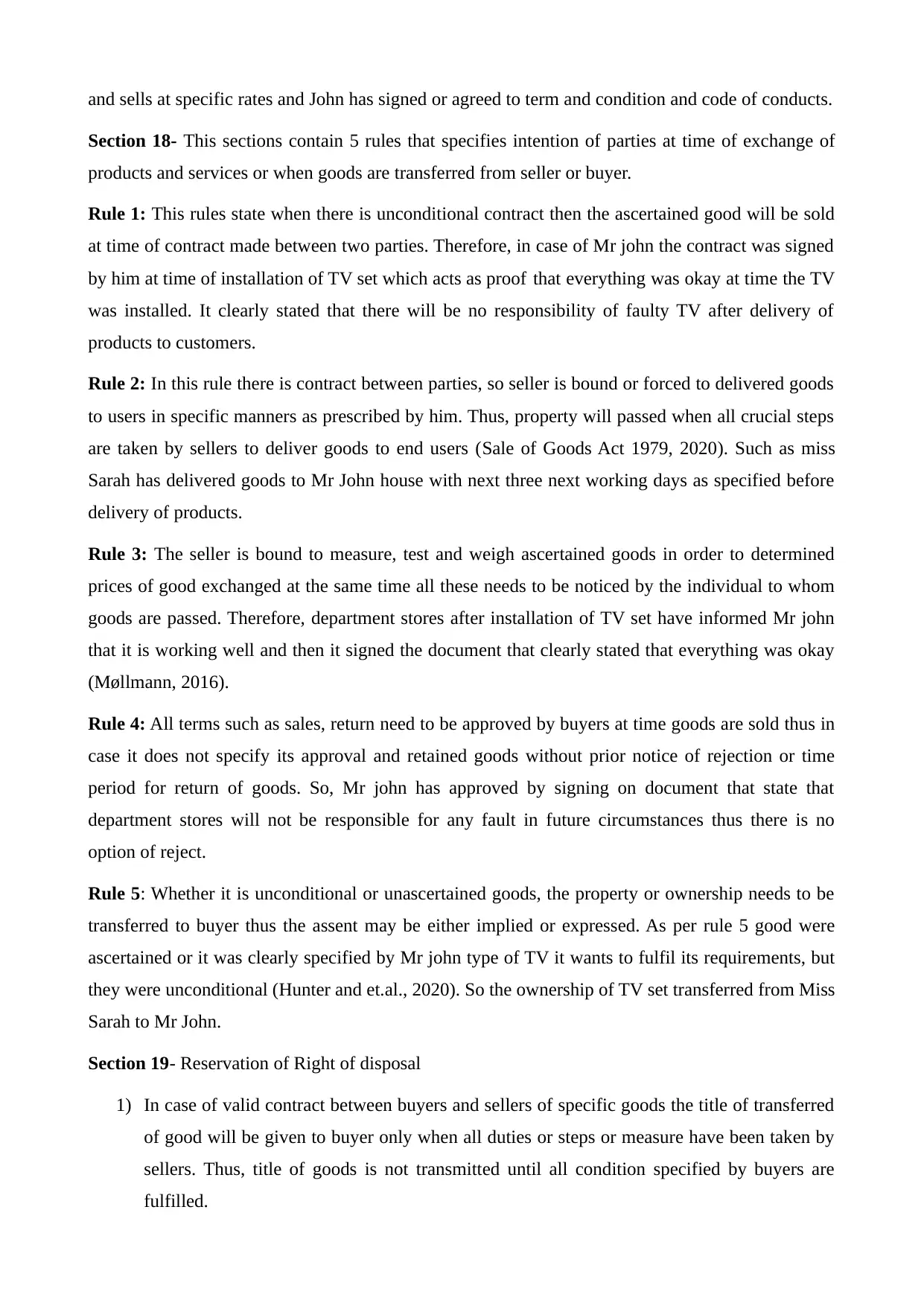
and sells at specific rates and John has signed or agreed to term and condition and code of conducts.
Section 18- This sections contain 5 rules that specifies intention of parties at time of exchange of
products and services or when goods are transferred from seller or buyer.
Rule 1: This rules state when there is unconditional contract then the ascertained good will be sold
at time of contract made between two parties. Therefore, in case of Mr john the contract was signed
by him at time of installation of TV set which acts as proof that everything was okay at time the TV
was installed. It clearly stated that there will be no responsibility of faulty TV after delivery of
products to customers.
Rule 2: In this rule there is contract between parties, so seller is bound or forced to delivered goods
to users in specific manners as prescribed by him. Thus, property will passed when all crucial steps
are taken by sellers to deliver goods to end users (Sale of Goods Act 1979, 2020). Such as miss
Sarah has delivered goods to Mr John house with next three next working days as specified before
delivery of products.
Rule 3: The seller is bound to measure, test and weigh ascertained goods in order to determined
prices of good exchanged at the same time all these needs to be noticed by the individual to whom
goods are passed. Therefore, department stores after installation of TV set have informed Mr john
that it is working well and then it signed the document that clearly stated that everything was okay
(Møllmann, 2016).
Rule 4: All terms such as sales, return need to be approved by buyers at time goods are sold thus in
case it does not specify its approval and retained goods without prior notice of rejection or time
period for return of goods. So, Mr john has approved by signing on document that state that
department stores will not be responsible for any fault in future circumstances thus there is no
option of reject.
Rule 5: Whether it is unconditional or unascertained goods, the property or ownership needs to be
transferred to buyer thus the assent may be either implied or expressed. As per rule 5 good were
ascertained or it was clearly specified by Mr john type of TV it wants to fulfil its requirements, but
they were unconditional (Hunter and et.al., 2020). So the ownership of TV set transferred from Miss
Sarah to Mr John.
Section 19- Reservation of Right of disposal
1) In case of valid contract between buyers and sellers of specific goods the title of transferred
of good will be given to buyer only when all duties or steps or measure have been taken by
sellers. Thus, title of goods is not transmitted until all condition specified by buyers are
fulfilled.
Section 18- This sections contain 5 rules that specifies intention of parties at time of exchange of
products and services or when goods are transferred from seller or buyer.
Rule 1: This rules state when there is unconditional contract then the ascertained good will be sold
at time of contract made between two parties. Therefore, in case of Mr john the contract was signed
by him at time of installation of TV set which acts as proof that everything was okay at time the TV
was installed. It clearly stated that there will be no responsibility of faulty TV after delivery of
products to customers.
Rule 2: In this rule there is contract between parties, so seller is bound or forced to delivered goods
to users in specific manners as prescribed by him. Thus, property will passed when all crucial steps
are taken by sellers to deliver goods to end users (Sale of Goods Act 1979, 2020). Such as miss
Sarah has delivered goods to Mr John house with next three next working days as specified before
delivery of products.
Rule 3: The seller is bound to measure, test and weigh ascertained goods in order to determined
prices of good exchanged at the same time all these needs to be noticed by the individual to whom
goods are passed. Therefore, department stores after installation of TV set have informed Mr john
that it is working well and then it signed the document that clearly stated that everything was okay
(Møllmann, 2016).
Rule 4: All terms such as sales, return need to be approved by buyers at time goods are sold thus in
case it does not specify its approval and retained goods without prior notice of rejection or time
period for return of goods. So, Mr john has approved by signing on document that state that
department stores will not be responsible for any fault in future circumstances thus there is no
option of reject.
Rule 5: Whether it is unconditional or unascertained goods, the property or ownership needs to be
transferred to buyer thus the assent may be either implied or expressed. As per rule 5 good were
ascertained or it was clearly specified by Mr john type of TV it wants to fulfil its requirements, but
they were unconditional (Hunter and et.al., 2020). So the ownership of TV set transferred from Miss
Sarah to Mr John.
Section 19- Reservation of Right of disposal
1) In case of valid contract between buyers and sellers of specific goods the title of transferred
of good will be given to buyer only when all duties or steps or measure have been taken by
sellers. Thus, title of goods is not transmitted until all condition specified by buyers are
fulfilled.
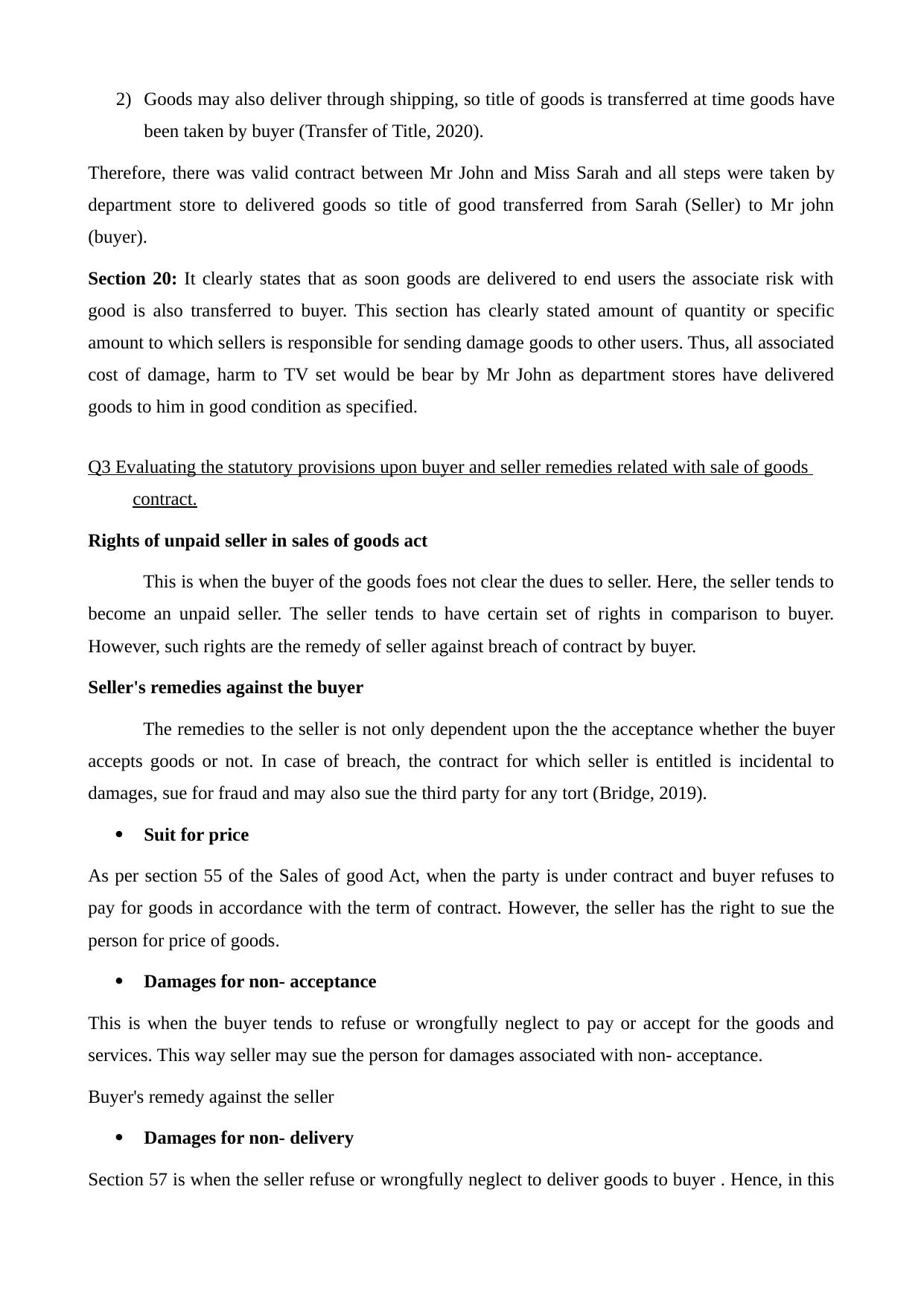
2) Goods may also deliver through shipping, so title of goods is transferred at time goods have
been taken by buyer (Transfer of Title, 2020).
Therefore, there was valid contract between Mr John and Miss Sarah and all steps were taken by
department store to delivered goods so title of good transferred from Sarah (Seller) to Mr john
(buyer).
Section 20: It clearly states that as soon goods are delivered to end users the associate risk with
good is also transferred to buyer. This section has clearly stated amount of quantity or specific
amount to which sellers is responsible for sending damage goods to other users. Thus, all associated
cost of damage, harm to TV set would be bear by Mr John as department stores have delivered
goods to him in good condition as specified.
Q3 Evaluating the statutory provisions upon buyer and seller remedies related with sale of goods
contract.
Rights of unpaid seller in sales of goods act
This is when the buyer of the goods foes not clear the dues to seller. Here, the seller tends to
become an unpaid seller. The seller tends to have certain set of rights in comparison to buyer.
However, such rights are the remedy of seller against breach of contract by buyer.
Seller's remedies against the buyer
The remedies to the seller is not only dependent upon the the acceptance whether the buyer
accepts goods or not. In case of breach, the contract for which seller is entitled is incidental to
damages, sue for fraud and may also sue the third party for any tort (Bridge, 2019).
Suit for price
As per section 55 of the Sales of good Act, when the party is under contract and buyer refuses to
pay for goods in accordance with the term of contract. However, the seller has the right to sue the
person for price of goods.
Damages for non- acceptance
This is when the buyer tends to refuse or wrongfully neglect to pay or accept for the goods and
services. This way seller may sue the person for damages associated with non- acceptance.
Buyer's remedy against the seller
Damages for non- delivery
Section 57 is when the seller refuse or wrongfully neglect to deliver goods to buyer . Hence, in this
been taken by buyer (Transfer of Title, 2020).
Therefore, there was valid contract between Mr John and Miss Sarah and all steps were taken by
department store to delivered goods so title of good transferred from Sarah (Seller) to Mr john
(buyer).
Section 20: It clearly states that as soon goods are delivered to end users the associate risk with
good is also transferred to buyer. This section has clearly stated amount of quantity or specific
amount to which sellers is responsible for sending damage goods to other users. Thus, all associated
cost of damage, harm to TV set would be bear by Mr John as department stores have delivered
goods to him in good condition as specified.
Q3 Evaluating the statutory provisions upon buyer and seller remedies related with sale of goods
contract.
Rights of unpaid seller in sales of goods act
This is when the buyer of the goods foes not clear the dues to seller. Here, the seller tends to
become an unpaid seller. The seller tends to have certain set of rights in comparison to buyer.
However, such rights are the remedy of seller against breach of contract by buyer.
Seller's remedies against the buyer
The remedies to the seller is not only dependent upon the the acceptance whether the buyer
accepts goods or not. In case of breach, the contract for which seller is entitled is incidental to
damages, sue for fraud and may also sue the third party for any tort (Bridge, 2019).
Suit for price
As per section 55 of the Sales of good Act, when the party is under contract and buyer refuses to
pay for goods in accordance with the term of contract. However, the seller has the right to sue the
person for price of goods.
Damages for non- acceptance
This is when the buyer tends to refuse or wrongfully neglect to pay or accept for the goods and
services. This way seller may sue the person for damages associated with non- acceptance.
Buyer's remedy against the seller
Damages for non- delivery
Section 57 is when the seller refuse or wrongfully neglect to deliver goods to buyer . Hence, in this
⊘ This is a preview!⊘
Do you want full access?
Subscribe today to unlock all pages.

Trusted by 1+ million students worldwide
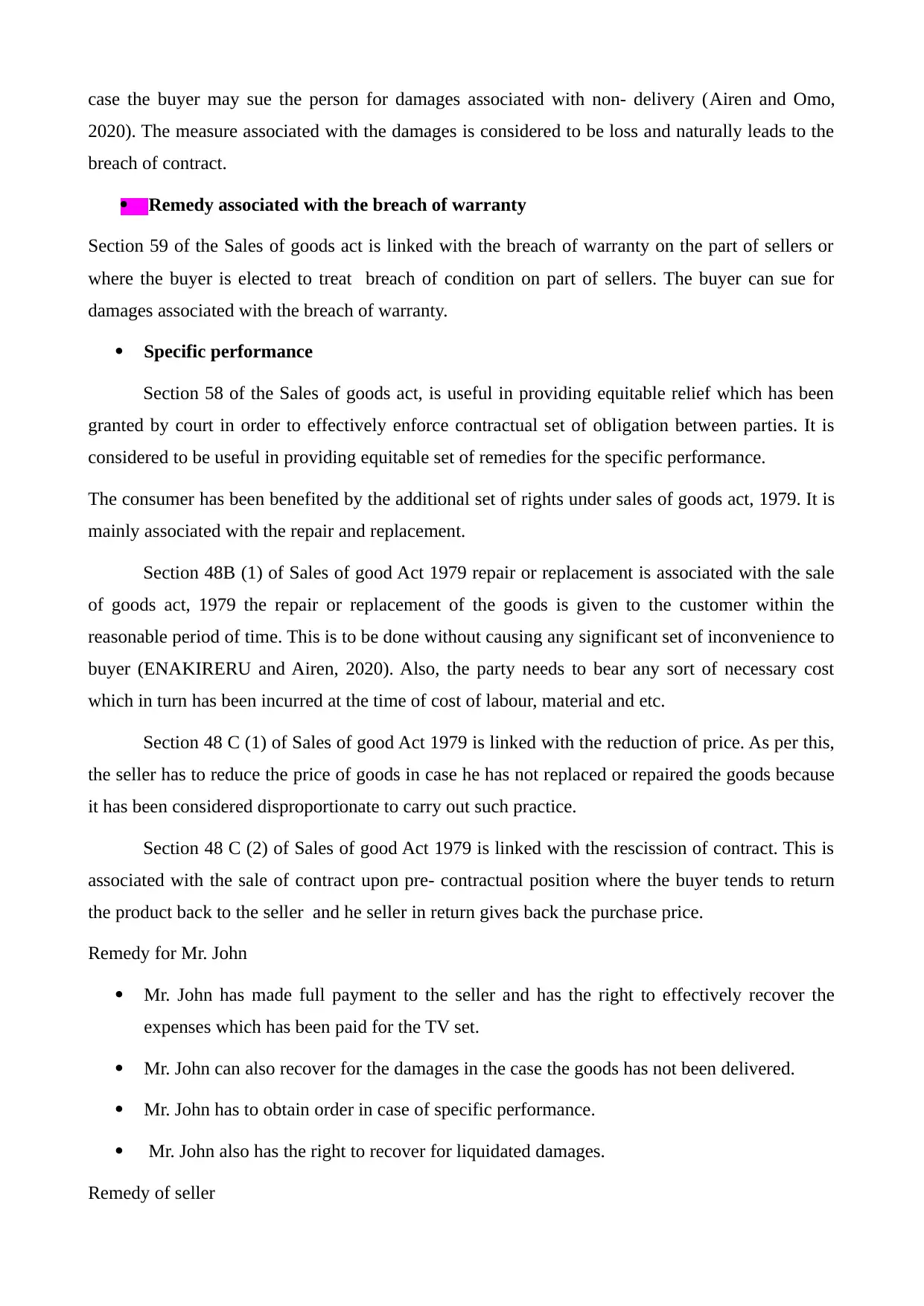
case the buyer may sue the person for damages associated with non- delivery (Airen and Omo,
2020). The measure associated with the damages is considered to be loss and naturally leads to the
breach of contract.
Remedy associated with the breach of warranty
Section 59 of the Sales of goods act is linked with the breach of warranty on the part of sellers or
where the buyer is elected to treat breach of condition on part of sellers. The buyer can sue for
damages associated with the breach of warranty.
Specific performance
Section 58 of the Sales of goods act, is useful in providing equitable relief which has been
granted by court in order to effectively enforce contractual set of obligation between parties. It is
considered to be useful in providing equitable set of remedies for the specific performance.
The consumer has been benefited by the additional set of rights under sales of goods act, 1979. It is
mainly associated with the repair and replacement.
Section 48B (1) of Sales of good Act 1979 repair or replacement is associated with the sale
of goods act, 1979 the repair or replacement of the goods is given to the customer within the
reasonable period of time. This is to be done without causing any significant set of inconvenience to
buyer (ENAKIRERU and Airen, 2020). Also, the party needs to bear any sort of necessary cost
which in turn has been incurred at the time of cost of labour, material and etc.
Section 48 C (1) of Sales of good Act 1979 is linked with the reduction of price. As per this,
the seller has to reduce the price of goods in case he has not replaced or repaired the goods because
it has been considered disproportionate to carry out such practice.
Section 48 C (2) of Sales of good Act 1979 is linked with the rescission of contract. This is
associated with the sale of contract upon pre- contractual position where the buyer tends to return
the product back to the seller and he seller in return gives back the purchase price.
Remedy for Mr. John
Mr. John has made full payment to the seller and has the right to effectively recover the
expenses which has been paid for the TV set.
Mr. John can also recover for the damages in the case the goods has not been delivered.
Mr. John has to obtain order in case of specific performance.
Mr. John also has the right to recover for liquidated damages.
Remedy of seller
2020). The measure associated with the damages is considered to be loss and naturally leads to the
breach of contract.
Remedy associated with the breach of warranty
Section 59 of the Sales of goods act is linked with the breach of warranty on the part of sellers or
where the buyer is elected to treat breach of condition on part of sellers. The buyer can sue for
damages associated with the breach of warranty.
Specific performance
Section 58 of the Sales of goods act, is useful in providing equitable relief which has been
granted by court in order to effectively enforce contractual set of obligation between parties. It is
considered to be useful in providing equitable set of remedies for the specific performance.
The consumer has been benefited by the additional set of rights under sales of goods act, 1979. It is
mainly associated with the repair and replacement.
Section 48B (1) of Sales of good Act 1979 repair or replacement is associated with the sale
of goods act, 1979 the repair or replacement of the goods is given to the customer within the
reasonable period of time. This is to be done without causing any significant set of inconvenience to
buyer (ENAKIRERU and Airen, 2020). Also, the party needs to bear any sort of necessary cost
which in turn has been incurred at the time of cost of labour, material and etc.
Section 48 C (1) of Sales of good Act 1979 is linked with the reduction of price. As per this,
the seller has to reduce the price of goods in case he has not replaced or repaired the goods because
it has been considered disproportionate to carry out such practice.
Section 48 C (2) of Sales of good Act 1979 is linked with the rescission of contract. This is
associated with the sale of contract upon pre- contractual position where the buyer tends to return
the product back to the seller and he seller in return gives back the purchase price.
Remedy for Mr. John
Mr. John has made full payment to the seller and has the right to effectively recover the
expenses which has been paid for the TV set.
Mr. John can also recover for the damages in the case the goods has not been delivered.
Mr. John has to obtain order in case of specific performance.
Mr. John also has the right to recover for liquidated damages.
Remedy of seller
Paraphrase This Document
Need a fresh take? Get an instant paraphrase of this document with our AI Paraphraser
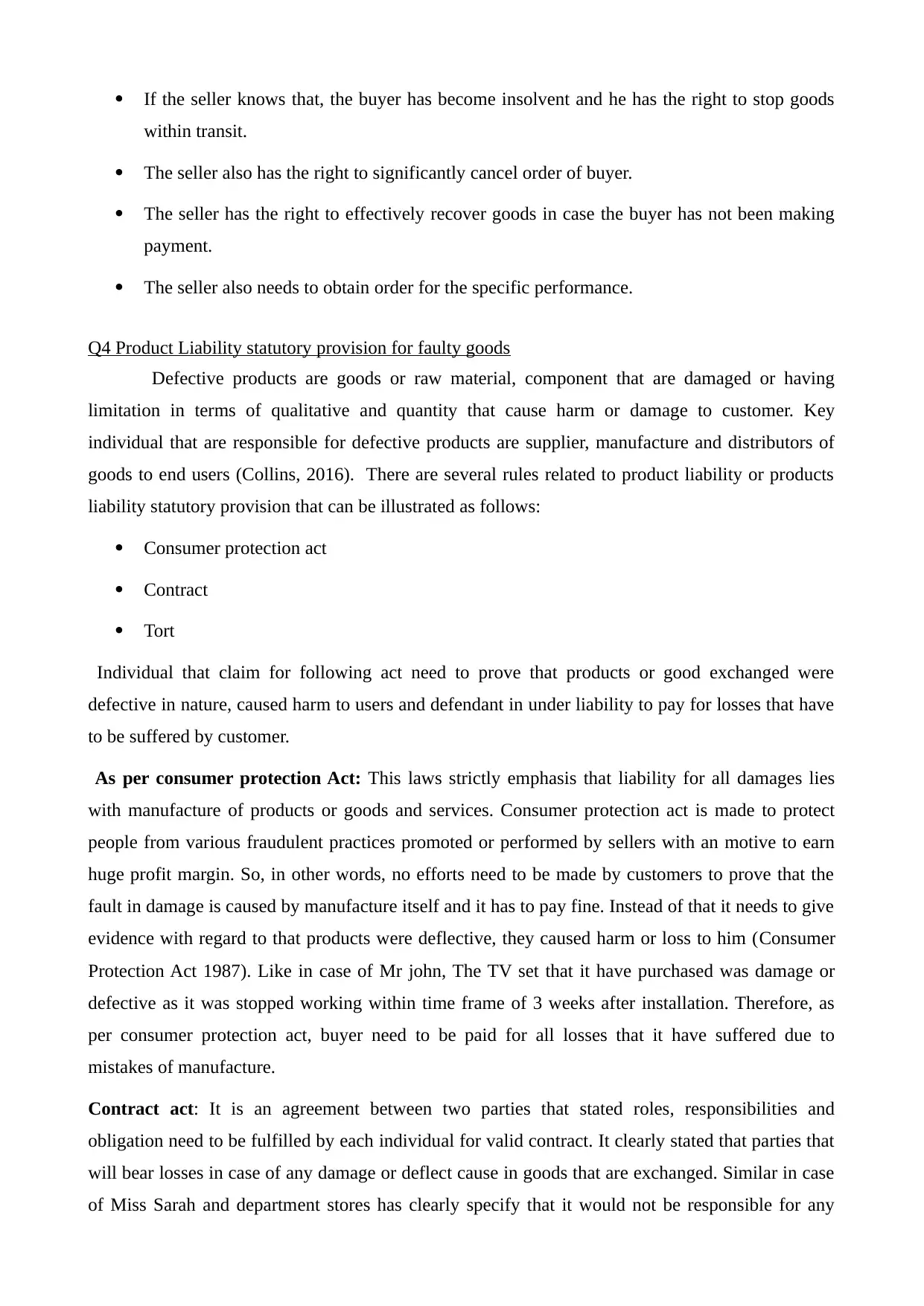
If the seller knows that, the buyer has become insolvent and he has the right to stop goods
within transit.
The seller also has the right to significantly cancel order of buyer.
The seller has the right to effectively recover goods in case the buyer has not been making
payment.
The seller also needs to obtain order for the specific performance.
Q4 Product Liability statutory provision for faulty goods
Defective products are goods or raw material, component that are damaged or having
limitation in terms of qualitative and quantity that cause harm or damage to customer. Key
individual that are responsible for defective products are supplier, manufacture and distributors of
goods to end users (Collins, 2016). There are several rules related to product liability or products
liability statutory provision that can be illustrated as follows:
Consumer protection act
Contract
Tort
Individual that claim for following act need to prove that products or good exchanged were
defective in nature, caused harm to users and defendant in under liability to pay for losses that have
to be suffered by customer.
As per consumer protection Act: This laws strictly emphasis that liability for all damages lies
with manufacture of products or goods and services. Consumer protection act is made to protect
people from various fraudulent practices promoted or performed by sellers with an motive to earn
huge profit margin. So, in other words, no efforts need to be made by customers to prove that the
fault in damage is caused by manufacture itself and it has to pay fine. Instead of that it needs to give
evidence with regard to that products were deflective, they caused harm or loss to him (Consumer
Protection Act 1987). Like in case of Mr john, The TV set that it have purchased was damage or
defective as it was stopped working within time frame of 3 weeks after installation. Therefore, as
per consumer protection act, buyer need to be paid for all losses that it have suffered due to
mistakes of manufacture.
Contract act: It is an agreement between two parties that stated roles, responsibilities and
obligation need to be fulfilled by each individual for valid contract. It clearly stated that parties that
will bear losses in case of any damage or deflect cause in goods that are exchanged. Similar in case
of Miss Sarah and department stores has clearly specify that it would not be responsible for any
within transit.
The seller also has the right to significantly cancel order of buyer.
The seller has the right to effectively recover goods in case the buyer has not been making
payment.
The seller also needs to obtain order for the specific performance.
Q4 Product Liability statutory provision for faulty goods
Defective products are goods or raw material, component that are damaged or having
limitation in terms of qualitative and quantity that cause harm or damage to customer. Key
individual that are responsible for defective products are supplier, manufacture and distributors of
goods to end users (Collins, 2016). There are several rules related to product liability or products
liability statutory provision that can be illustrated as follows:
Consumer protection act
Contract
Tort
Individual that claim for following act need to prove that products or good exchanged were
defective in nature, caused harm to users and defendant in under liability to pay for losses that have
to be suffered by customer.
As per consumer protection Act: This laws strictly emphasis that liability for all damages lies
with manufacture of products or goods and services. Consumer protection act is made to protect
people from various fraudulent practices promoted or performed by sellers with an motive to earn
huge profit margin. So, in other words, no efforts need to be made by customers to prove that the
fault in damage is caused by manufacture itself and it has to pay fine. Instead of that it needs to give
evidence with regard to that products were deflective, they caused harm or loss to him (Consumer
Protection Act 1987). Like in case of Mr john, The TV set that it have purchased was damage or
defective as it was stopped working within time frame of 3 weeks after installation. Therefore, as
per consumer protection act, buyer need to be paid for all losses that it have suffered due to
mistakes of manufacture.
Contract act: It is an agreement between two parties that stated roles, responsibilities and
obligation need to be fulfilled by each individual for valid contract. It clearly stated that parties that
will bear losses in case of any damage or deflect cause in goods that are exchanged. Similar in case
of Miss Sarah and department stores has clearly specify that it would not be responsible for any
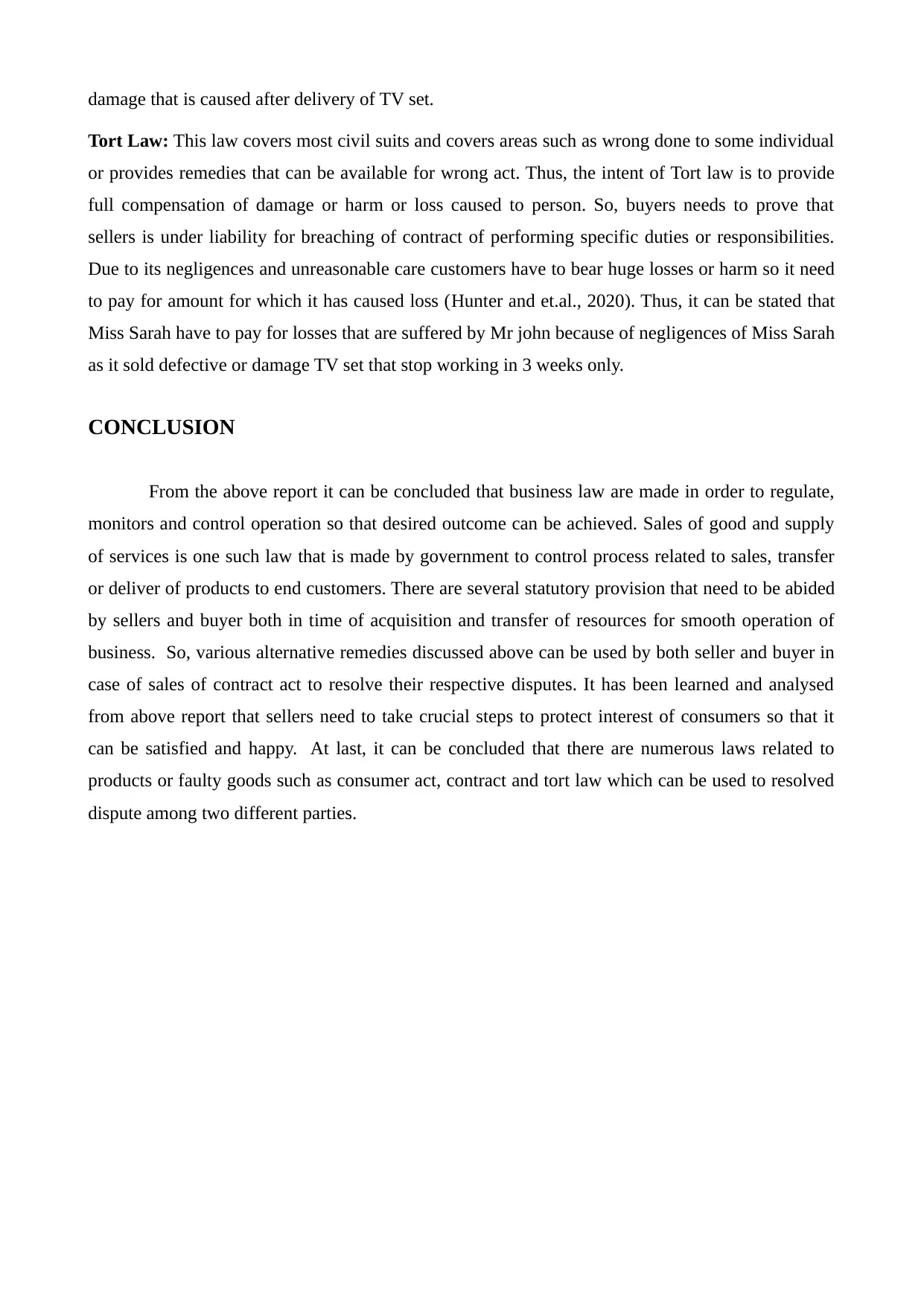
damage that is caused after delivery of TV set.
Tort Law: This law covers most civil suits and covers areas such as wrong done to some individual
or provides remedies that can be available for wrong act. Thus, the intent of Tort law is to provide
full compensation of damage or harm or loss caused to person. So, buyers needs to prove that
sellers is under liability for breaching of contract of performing specific duties or responsibilities.
Due to its negligences and unreasonable care customers have to bear huge losses or harm so it need
to pay for amount for which it has caused loss (Hunter and et.al., 2020). Thus, it can be stated that
Miss Sarah have to pay for losses that are suffered by Mr john because of negligences of Miss Sarah
as it sold defective or damage TV set that stop working in 3 weeks only.
CONCLUSION
From the above report it can be concluded that business law are made in order to regulate,
monitors and control operation so that desired outcome can be achieved. Sales of good and supply
of services is one such law that is made by government to control process related to sales, transfer
or deliver of products to end customers. There are several statutory provision that need to be abided
by sellers and buyer both in time of acquisition and transfer of resources for smooth operation of
business. So, various alternative remedies discussed above can be used by both seller and buyer in
case of sales of contract act to resolve their respective disputes. It has been learned and analysed
from above report that sellers need to take crucial steps to protect interest of consumers so that it
can be satisfied and happy. At last, it can be concluded that there are numerous laws related to
products or faulty goods such as consumer act, contract and tort law which can be used to resolved
dispute among two different parties.
Tort Law: This law covers most civil suits and covers areas such as wrong done to some individual
or provides remedies that can be available for wrong act. Thus, the intent of Tort law is to provide
full compensation of damage or harm or loss caused to person. So, buyers needs to prove that
sellers is under liability for breaching of contract of performing specific duties or responsibilities.
Due to its negligences and unreasonable care customers have to bear huge losses or harm so it need
to pay for amount for which it has caused loss (Hunter and et.al., 2020). Thus, it can be stated that
Miss Sarah have to pay for losses that are suffered by Mr john because of negligences of Miss Sarah
as it sold defective or damage TV set that stop working in 3 weeks only.
CONCLUSION
From the above report it can be concluded that business law are made in order to regulate,
monitors and control operation so that desired outcome can be achieved. Sales of good and supply
of services is one such law that is made by government to control process related to sales, transfer
or deliver of products to end customers. There are several statutory provision that need to be abided
by sellers and buyer both in time of acquisition and transfer of resources for smooth operation of
business. So, various alternative remedies discussed above can be used by both seller and buyer in
case of sales of contract act to resolve their respective disputes. It has been learned and analysed
from above report that sellers need to take crucial steps to protect interest of consumers so that it
can be satisfied and happy. At last, it can be concluded that there are numerous laws related to
products or faulty goods such as consumer act, contract and tort law which can be used to resolved
dispute among two different parties.
⊘ This is a preview!⊘
Do you want full access?
Subscribe today to unlock all pages.

Trusted by 1+ million students worldwide
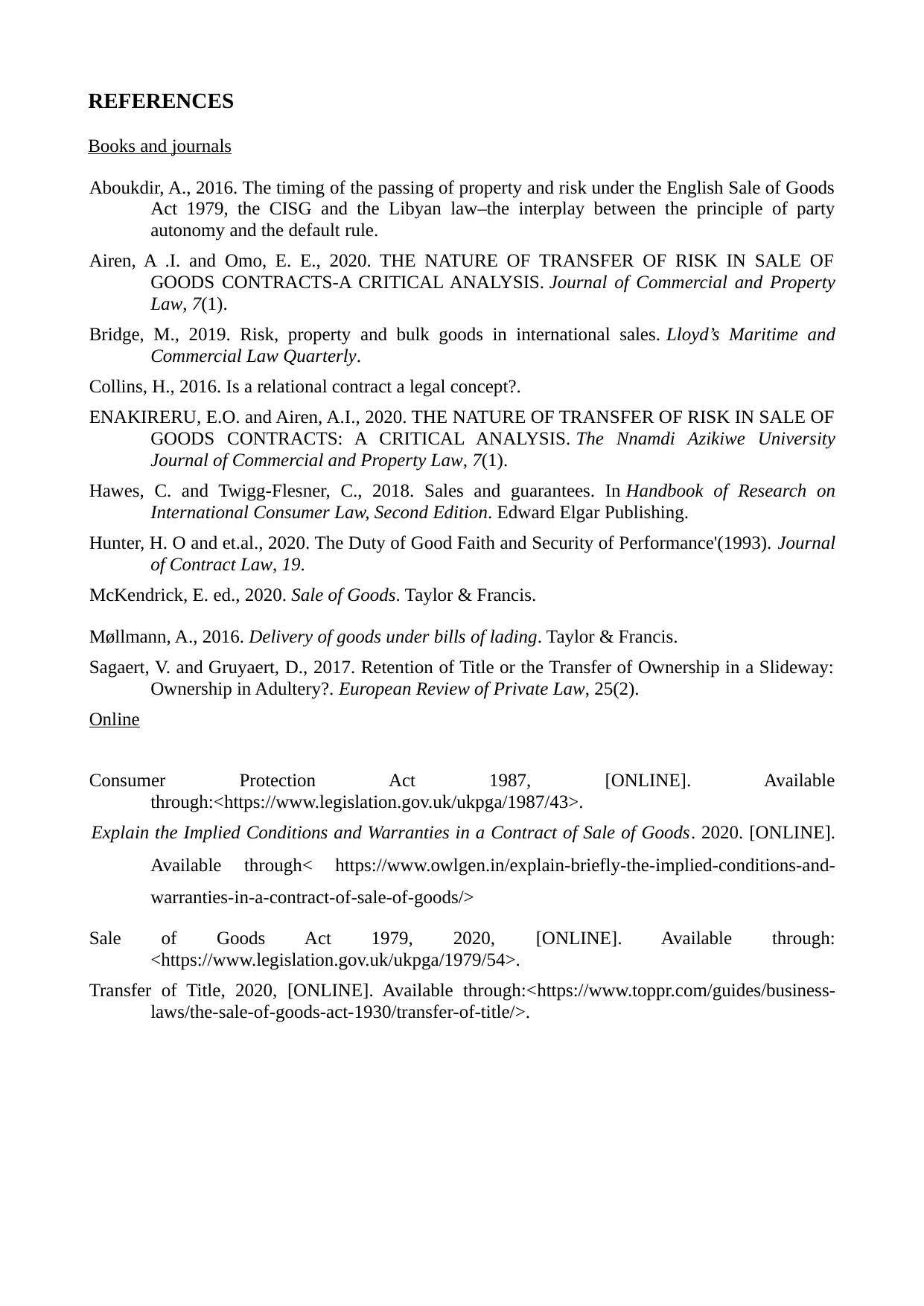
REFERENCES
Books and journals
Aboukdir, A., 2016. The timing of the passing of property and risk under the English Sale of Goods
Act 1979, the CISG and the Libyan law–the interplay between the principle of party
autonomy and the default rule.
Airen, A .I. and Omo, E. E., 2020. THE NATURE OF TRANSFER OF RISK IN SALE OF
GOODS CONTRACTS-A CRITICAL ANALYSIS. Journal of Commercial and Property
Law, 7(1).
Bridge, M., 2019. Risk, property and bulk goods in international sales. Lloyd’s Maritime and
Commercial Law Quarterly.
Collins, H., 2016. Is a relational contract a legal concept?.
ENAKIRERU, E.O. and Airen, A.I., 2020. THE NATURE OF TRANSFER OF RISK IN SALE OF
GOODS CONTRACTS: A CRITICAL ANALYSIS. The Nnamdi Azikiwe University
Journal of Commercial and Property Law, 7(1).
Hawes, C. and Twigg-Flesner, C., 2018. Sales and guarantees. In Handbook of Research on
International Consumer Law, Second Edition. Edward Elgar Publishing.
Hunter, H. O and et.al., 2020. The Duty of Good Faith and Security of Performance'(1993). Journal
of Contract Law, 19.
McKendrick, E. ed., 2020. Sale of Goods. Taylor & Francis.
Møllmann, A., 2016. Delivery of goods under bills of lading. Taylor & Francis.
Sagaert, V. and Gruyaert, D., 2017. Retention of Title or the Transfer of Ownership in a Slideway:
Ownership in Adultery?. European Review of Private Law, 25(2).
Online
Consumer Protection Act 1987, [ONLINE]. Available
through:<https://www.legislation.gov.uk/ukpga/1987/43>.
Explain the Implied Conditions and Warranties in a Contract of Sale of Goods. 2020. [ONLINE].
Available through< https://www.owlgen.in/explain-briefly-the-implied-conditions-and-
warranties-in-a-contract-of-sale-of-goods/>
Sale of Goods Act 1979, 2020, [ONLINE]. Available through:
<https://www.legislation.gov.uk/ukpga/1979/54>.
Transfer of Title, 2020, [ONLINE]. Available through:<https://www.toppr.com/guides/business-
laws/the-sale-of-goods-act-1930/transfer-of-title/>.
Books and journals
Aboukdir, A., 2016. The timing of the passing of property and risk under the English Sale of Goods
Act 1979, the CISG and the Libyan law–the interplay between the principle of party
autonomy and the default rule.
Airen, A .I. and Omo, E. E., 2020. THE NATURE OF TRANSFER OF RISK IN SALE OF
GOODS CONTRACTS-A CRITICAL ANALYSIS. Journal of Commercial and Property
Law, 7(1).
Bridge, M., 2019. Risk, property and bulk goods in international sales. Lloyd’s Maritime and
Commercial Law Quarterly.
Collins, H., 2016. Is a relational contract a legal concept?.
ENAKIRERU, E.O. and Airen, A.I., 2020. THE NATURE OF TRANSFER OF RISK IN SALE OF
GOODS CONTRACTS: A CRITICAL ANALYSIS. The Nnamdi Azikiwe University
Journal of Commercial and Property Law, 7(1).
Hawes, C. and Twigg-Flesner, C., 2018. Sales and guarantees. In Handbook of Research on
International Consumer Law, Second Edition. Edward Elgar Publishing.
Hunter, H. O and et.al., 2020. The Duty of Good Faith and Security of Performance'(1993). Journal
of Contract Law, 19.
McKendrick, E. ed., 2020. Sale of Goods. Taylor & Francis.
Møllmann, A., 2016. Delivery of goods under bills of lading. Taylor & Francis.
Sagaert, V. and Gruyaert, D., 2017. Retention of Title or the Transfer of Ownership in a Slideway:
Ownership in Adultery?. European Review of Private Law, 25(2).
Online
Consumer Protection Act 1987, [ONLINE]. Available
through:<https://www.legislation.gov.uk/ukpga/1987/43>.
Explain the Implied Conditions and Warranties in a Contract of Sale of Goods. 2020. [ONLINE].
Available through< https://www.owlgen.in/explain-briefly-the-implied-conditions-and-
warranties-in-a-contract-of-sale-of-goods/>
Sale of Goods Act 1979, 2020, [ONLINE]. Available through:
<https://www.legislation.gov.uk/ukpga/1979/54>.
Transfer of Title, 2020, [ONLINE]. Available through:<https://www.toppr.com/guides/business-
laws/the-sale-of-goods-act-1930/transfer-of-title/>.
1 out of 10
Related Documents
Your All-in-One AI-Powered Toolkit for Academic Success.
+13062052269
info@desklib.com
Available 24*7 on WhatsApp / Email
![[object Object]](/_next/static/media/star-bottom.7253800d.svg)
Unlock your academic potential
Copyright © 2020–2026 A2Z Services. All Rights Reserved. Developed and managed by ZUCOL.




